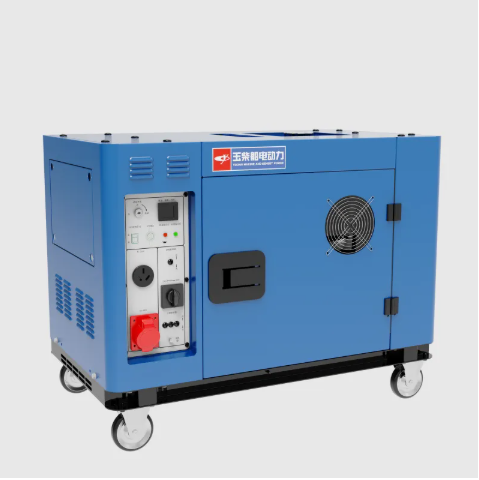ការយល់ដឹងអំពីផលប៉ះពាល់នៃកម្ពស់លើប្រព័ន្ធបង្កើតថាមពល
ដំណើរការ ម៉ាស៊ីនបំពេញទាហានដែលប្រើស៊ីល នៅតំបន់ខ្ពស់មានបញ្ហាប្រឈមតែមួយគត់ ដែលត្រូវការពិចារណាយ៉ាងប្រុងប្រយ័ត្ន និងឧបករណ៍ឯកទេស។ ដោយសារកម្រិតខ្យល់ថយចុះនៅពេលកម្ពស់កើនឡើង ប្រសិទ្ធភាពនៃម៉ាស៊ីនភ្លើងឌីស៊ីលធម្មតាអាចនឹងរងផលប៉ះពាល់យ៉ាងខ្លាំង ដែលបណ្តាលអោយមានការថយចុះនៃការបង្កើតថាមពល និងបញ្ហាប្រតិបត្តិការណ៍។ សៀវភៅណែនាំនេះនឹងជួយអ្នកក្នុងការជ្រើសរើស និងប្រើប្រាស់ម៉ាស៊ីនភ្លើងឌីស៊ីលនៅតំបន់ខ្ពស់ ដើម្បីធានាបាននូវប្រសិទ្ធភាព និងភាពជឿទុកចិត្តបានសម្រាប់តម្រូវការបង្កើតថាមពលរបស់អ្នក។
កត្តាសំខាន់ដែលប៉ះពាល់ដល់ប្រសិទ្ធភាពម៉ាស៊ីនភ្លើងឌីស៊ីលនៅកម្ពស់ខ្ពស់
ដង់ស៊ីតេខ្យល់ និងសមត្ថភាពរបស់ម៉ាស៊ីន
នៅកម្ពស់ខ្ពស់ ដង់ស៊ីតេខ្យល់ថយចុះ បណ្តាលឲ្យមានអុកស៊ីសេនតិចជាងសម្រាប់ការឆេះ។ ការផ្លាស់ប្ដូរលក្ខខណ្ឌបរិយាកាសនេះ អាចបណ្តាលឲ្យការបំប្លែងថាមពលរបស់ម៉ាស៊ីនភ្លើងម៉ាស៊ូតធ្លាក់ចុះប្រហែលជា 3% ក្នុងមួយ 1,000 ហ្វីត នៃកម្ពស់ពីលើមុខសមុទ្រ។ ខ្យល់ស្តើងប៉ះពាល់ដល់ផ្នែកផ្សេងៗនៃម៉ាស៊ីនភ្លើង រួមមានប្រសិទ្ធភាពនៃការឆេះឥន្ធនៈ ប្រព័ន្ធត្រជាក់ និងសមត្ថភាពសរុបរបស់ម៉ាស៊ីនម៉ាស៊ូតផងដែរ។
ការយល់ដឹងអំពីបញ្ហាលំបាកទាំងនេះដែលទាក់ទងនឹងកម្ពស់ គឺមានសារៈសំខាន់ណាស់សម្រាប់ការជ្រើសរើសម៉ាស៊ីនភ្លើងឲ្យសក្ដិសម។ ម៉ាស៊ីនភ្លើងមួយដែលដំណើរការបានល្អនៅលើមុខសមុទ្រ ប្រហែលជាមានបញ្ហាក្នុងការផ្គត់ផ្គង់ថាមពលនៅតាមទីតាំងខ្ពស់។ នេះហើយជាមូលហេតុដែលក្រុមហ៊ុនផលិតផ្តល់ឲ្យនូវកត្តានៃការថយចុះនៃថាមពល ដើម្បីជួយអ្នកប្រើប្រាស់គណនាថាមពលដែលអាចប្រើបាននៅតាមកម្ពស់ផ្សេងៗគ្នា។
ការផ្លាស់ប្ដូរសីតុណ្ហភាព និងតម្រូវការត្រជាក់
ទីតាំងខ្ពស់អាចបណ្តាលឱ្យមានការផ្លាស់ប្តូរសីតុណ្ហភាពយ៉ាងខ្លាំង ដែលប៉ះពាល់ដល់ប្រសិទ្ធភាពម៉ាស៊ីនភ្លើងឌីសែល។ ទោះបីជាសីតុណ្ហភាពត្រជាក់អាចមើលទៅដូចជាគុណប្រយោជន៍ក៏ដោយ ក៏វាអាចប៉ះពាល់ដល់កំរិតជាតិសំណើមនៃឥន្ធនៈ និងសមត្ថភាពចាប់ផ្តើមរបស់វា។ លើសពីនេះ ការកាត់បន្ថយនៃកំហាប់ខ្យល់ បានប៉ះពាល់ដល់ប្រសិទ្ធភាពនៃប្រព័ន្ធបន្ថយកំដៅ ដែលត្រូវការពិចារណាយ៉ាងប្រុងប្រយ័ត្នលើទំហំ និងសមត្ថភាពបន្ថយកំដៅ។
ម៉ាស៊ីនភ្លើងឌីសែលទំនើបៗ ត្រូវបានរចនាឡើងសម្រាប់ប្រតិបត្តិការនៅកន្លែងខ្ពស់ ជារឿយៗមានប្រព័ន្ធបន្ថយកំដៅបន្ថែម និងការកែសម្រួលរចនាប៉ុងបន្ថែម ដើម្បីទប់ស្កាត់បញ្ហាទាំងនេះ។ ការកែសម្រួលទាំងនេះធានាបាននូវការប្រតិបត្តិការដែលអាចទុកចិត្តបាន សូម្បីតែនៅក្នុងបរិស្ថានភ្នំដែលលំបាកបំផុតក៏ដោយ។

គុណសម្បត្តិសំខាន់ៗសម្រាប់ម៉ាស៊ីនភ្លើងឌីសែលនៅកន្លែងខ្ពស់
ប្រព័ន្ធដំឡើងសម្ពាធខ្យល់ (Turbocharging) និងប្រព័ន្ធបន្ថយកំដៅខ្យល់ (Intercooling)
ការបំពេញដោយខ្យល់សុីសូរត្រូវបានកាន់តែសំខាន់នៅកម្ពស់លើ ព្រោះវាជួយកែសំរួលនូវការថយចុះនៃកំហាប់ខ្យល់ដោយការបញ្ចូលខ្យល់ចូលក្នុងបន្ទប់ឆេះឲកាន់តែច្រើន។ ប្រព័ន្ធការបំពេញដោយខ្យល់សុីសូរអគ្គិសនីដែលបានរចនាឡើងវិសាលភាពសំរាប់ប្រើប្រាស់នៅកម្ពស់លើ អាចជួយបង្កើនប្រសិទ្ធភាព និង ប្រសិទ្ធភាពនៃការប្រើប្រាស់ម៉ាស៊ីនភ្លើងបានយ៉ាងខ្លាំង។ ប្រព័ន្ធទាំងនេះធ្វើការជាមួយនឹងប្រព័ន្ធកំហាប់ខ្យល់ក្តៅ ដើម្បីបញ្ជូននូវកំហាប់ខ្យល់ និងសីតុណ្ហភាពឲបានត្រឹមត្រូវសំរាប់ការឆេះប្រកបដោយប្រសិទ្ធភាព។
ម៉ាស៊ីនភ្លើងដែលប្រើប្រាស់ប្រេងដែលមានការបំពេញខ្យល់សុីសូរបែបទំនើបជាច្រើន ត្រូវបានបំពាក់នូវប្រព័ន្ធការបំពេញដោយខ្យល់សុីសូរដែលអាចកែសំរួលបាន ដែលអាចកែសំរួលដំណើរការរបស់វាអាស្រ័យលើកម្ពស់ និងលក្ខខណ្ឌនៃការប្រើប្រាស់។ បច្ចេកវិទ្យាដែលអាចកែសំរួលបាននេះ ជួយរក្សាកំលាំងបានថេរ និងការប្រើប្រាស់បានល្អនៅកម្ពស់ខុសៗគ្នា និងលក្ខខណ្ឌនៃការប្រើប្រាស់ផ្សេងៗ។
ការកែប្រែប្រព័ន្ធប្រេង
ប្រព័ន្ធប្រេងឥន្ធនៈនៅក្នុងម៉ាស៊ីនភ្លើងដែលស្ថិតនៅកំរិតខ្ពស់ តម្រូវឱ្យមានការកែសំរួលជាក់លាក់ដើម្បីធានាឱ្យមានដំណើរការប្រកបដោយប្រសិទ្ធភាព។ ការកែសំរួលនៅរាប់បញ្ចូលទាំងការកែសំរួលពេលវេលានៃការបាញ់ប្រេងឥន្ធនៈ ការកែសំរួលកាលីប្រេស៊ីនប៉ូមប្រេងឥន្ធនៈ និងការកែសំរួលប្រភេទនៃប្រអប់បាញ់ប្រេងឥន្ធនៈ។ ការកែសំរួលទាំងនេះមានបំណងធ្វើឱ្យប្រសើរឡើងនូវការចម្រាញ់នៃចំហាយប្រេងឥន្ធនៈ និងខ្យល់ ដើម្បីឱ្យការឆេះពីរីករាយក្នុងសម្ពាធអាកាសធាតុទាប។
ប្រព័ន្ធបាញ់ប្រេងឥន្ធនៈអេឡិចត្រូនិចអាចធ្វើការកែសំរួលការផ្គត់ផ្គង់ប្រេងឥន្ធនៈដោយស្វ័យប្រវត្តិ ដោយផ្អែកលើកំរិតកំពស់ និងលក្ខខណ្ឌនៃអាកាសធាតុ ដើម្បីធានាឱ្យមានដំណើរការប្រកបដោយប្រសិទ្ធភាពដោយគ្មានការពាក់ព័ន្ធពីមនុស្ស។ បច្ចេកវិទ្យាថ្មីនេះបានធ្វើឱ្យមានការបំផុសគំនិតថ្មីនៅក្នុងការប្រើប្រាស់ម៉ាស៊ីនភ្លើងនៅកំរិតខ្ពស់ ដោយធ្វើឱ្យវាមានសុវត្ថិភាព និងប្រសិទ្ធភាពច្រើនជាងពេលមុន។
ការយល់ព្រមអំពីការដាក់តំឡើង និងការរក្សាសំណើរ
ការត្រៀមចំណត និងការការពារបរិស្ថាន
ការរៀបចំគេហដ្ឋានឱ្យបានត្រឹមត្រូវគឺជាកត្តាសំខាន់សម្រាប់ការដំឡើងម៉ាស៊ីនភ្លើងដែលប្រើប្រេងដៅនៅកម្ពស់ខ្ពស់។ ការរៀបចំនេះរួមបញ្ចូលទាំងការធានានូវការបង្ហូរខ្យល់បានល្អ ការរចនាមូលដ្ឋានឱ្យបានត្រឹមត្រូវ និងការការពារពីលក្ខខណ្ឌអាកាសធាតុដ៏អាក្រក់។ គេហដ្ឋានដំឡើងគួរតែគិតគូរដល់បន្ទុកពីទឹកកក ការប៉ះពាល់ពីខ្យល់ និងការងាយស្រួលសម្រាប់បុគ្គលិកធ្វើការថែទាំ។
វិធានការការពារបរិស្ថានកាន់តែមានសារសំខាន់នៅកម្ពស់ខ្ពស់ ដែលលក្ខខណ្ឌអាកាសធាតុអាចមានកម្រិតធ្ងន់ធ្ងរ។ វាអាចរួមបញ្ចូលនូវការគ្របដណ្តប់ឬបន្ទប់ឯកទេស ប្រព័ន្ធកំដៅសម្រាប់ការចាប់ផ្តើមនៅពេលអាកាសធាតុត្រជាក់ និងការការពារពីភ្លៀងនិងខ្យល់ដ៏រឹងមាំ ដើម្បីការពារផ្នែកដែលសំខាន់ៗ។
ការកំណត់កម្មវិធីថែទាំ និងការតាមដានដំណើរការ
ការថែទាំធម្មតាកាន់តែមានសារសំខាន់សម្រាប់ម៉ាស៊ីនភ្លើងដែលប្រើប្រេងដៅដែលដំណើរការនៅកម្ពស់ខ្ពស់។ គម្រោងថែទាំគួរតែត្រូវបានកែសម្រួលឱ្យសមស្របនឹងសម្ពាធផ្ទុកបន្ថែមដែលមានលើផ្នែកនានាដោយសារការដំណើរការនៅកម្ពស់ខ្ពស់។ វារួមបញ្ចូលទាំងការប្តូរប្រេងបញ្ចូលថ្មីជាញឹកញាប់ ការផ្លាស់ប្ដូរតម្រាក់ខ្យល់ និងការត្រួតពិនិត្យប្រព័ន្ធបន្ថយកំដៅ។
ការអនុវត្តប្រព័ន្ធតាមដានពីចម្ងាយអាចផ្តល់នូវទិន្នន័យសូចនាករដំណើរការតាមពេលវេលាជាក់ស្តែង និងការព្រមានជាមុនអំពីបញ្ហាសក្ដានុពល។ ប្រព័ន្ធទាំងនេះមានតម្លៃយ៉ាងខ្លាំងនៅក្នុងការដំឡើងនៅតំបន់ខ្ពស់ដែលការចូលទៅដល់ដោយផ្ទាល់អាចត្រូវបានកំណត់ដោយស្ថានភាពអាកាសធាតុ ឬរាងទំហំដី។
សំណួរដែលត្រូវបានសួរប្រចាំ
តើខ្ញុំអាចរំពឹងថានឹងបាត់បង់ថាមពលប៉ុន្មានពីម៉ាស៊ីនភ្លើងដែលខ្ញុំប្រើនៅកម្ពស់ខ្ពស់?
ជាទូទៅ ម៉ាស៊ីនភ្លើងដែលប្រើប្រាស់ជាតិម៉ាស៊ូនបាត់បង់ថាមពលប្រហែល 3% នៃសមត្ថភាពថាមពលដែលបានបញ្ជាក់ ក្នុងមួយកម្ពស់ 1,000 ហ្វីតពីលើកំរិតសមុទ្រ។ ទោះបីជាយ៉ាងណាក៏ដោយ ការបាត់បង់នេះអាចខុសគ្នាអាស្រ័យលើម៉ូឌែលម៉ាស៊ីនជាក់ស្តែង និងលក្ខណៈរបស់វាសម្រាប់ការប្រើប្រាស់នៅកម្ពស់ខ្ពស់។
តើត្រូវការកែប្រែអ្វីខ្លះដើម្បីឱ្យម៉ាស៊ីនដំណើរការបានល្អនៅតំបន់ខ្ពស់?
ការកែប្រែសំខាន់ៗរួមមាន ប្រព័ន្ធទ័របូ (Turbocharging) ដែលបានកែលម្អ ការកែតម្រឹមការបាញ់ប្រេងឥន្ធនៈ ប្រព័ន្ធបន្ថយកំដៅដែលបានធ្វើឱ្យប្រសើរឡើង និងអាចមានការប្រើប្រាស់ប៉័មត្រជាក់ដែលធំជាងមុន។ ម៉ាស៊ីនខ្លះក៏អាចត្រូវការតម្រងខ្យល់ឯកទេស និងប្រព័ន្ធគ្រប់គ្រងដែលបានកែប្រែសម្រាប់ប្រើនៅកម្ពស់ខ្ពស់ផងដែរ។
តើគួរធ្វើការថែទាំម៉ាស៊ីនភ្លើងដែលប្រើនៅតំបន់ខ្ពស់ញឹកប៉ុន្មាន?
ចន្លោះពេលថែទាំគួរតែកាត់បន្ថយ 25-30% បើធៀបនឹងប្រតិបត្តិការនៅកម្រិតសមុទ្រ។ នេះជាទូទៅមានន័យថា ការប្តូរប្រេងញឹកញាប់ ការផ្លាស់ប្ដូរអ័ព្ទតម្រងខ្យល់ និងការពិនិត្យប្រព័ន្ធសរុបដើម្បីធានាបាននូវការប្រតិបត្តិការដោយស្ថិតស្ថេរនៅក្នុងស្ថានភាពខ្ពស់នៅលើមេគង់។
តើម៉ាស៊ីនភ្លើងឌីសែលធម្មតាអាចប្រើបាននៅតំបន់ខ្ពស់បានទេ?
ខណៈដែលម៉ាស៊ីនភ្លើងធម្មតាអាចដំណើរការបាននៅតំបន់ខ្ពស់ ប៉ុន្តែវានឹងបាត់បង់ថាមពលយ៉ាងខ្លាំង ហើយប្រហែលជាមិនដំណើរការបានល្អនោះទេ។ វាត្រូវបានណែនាំឱ្យប្រើម៉ាស៊ីនភ្លើងដែលត្រូវបានរចនាឡើងជាពិសេស ឬកែប្រែសម្រាប់ការប្រតិបត្តិការនៅតំបន់ខ្ពស់ ដើម្បីធានានូវប្រសិទ្ធភាព និងអាយុកាលការប្រើប្រាស់បានយូរអង្វែង។

